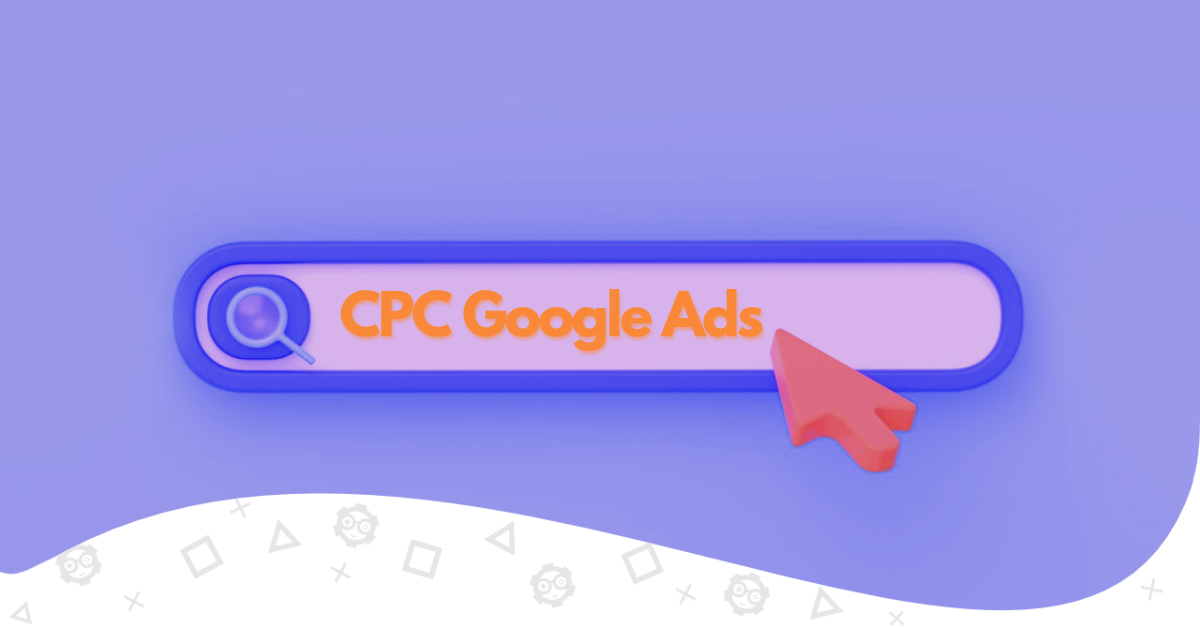Google Ads is one of the most essential platforms for digital advertising. There is one thing that we can be sure of when moving forward – it will only grow. So, it’s time to create your Google Ads account, and calculate the cost of what will transpire in the future.
This article will review the key elements of Google Ads – CPC. It’s one of the most essential concepts in the Pay-Per-Click advertising method, showing you how much it will cost to invest in this ad. Whether it’s Google Search Network or Google Display Ads, understanding the cost of target keywords can help you optimize your efforts and keep the budget tight! With that in mind, let’s review some critical elements of understanding CPC.
This article is a segment of a more extensive piece about Google Ads Metrics.
What Is CPC in Google Ads?

Let’s start with some definitions. CPC means – cost-per-click. It’s a metric used in online advertising that lets you see how much you spend for each click you have bought.
It’s all based on the auction system, where you bid against other advertisers on specific keywords you have chosen. If you win, your ad will be displayed next on the Search Engine Results Page relevant to the particular search. You can change the ad position, keywords, and all ad copy to lower the cost of your CPC. We will delve deeper into that further in the article.
When setting up your account, you create the maximum bid you will pay to control your spending. Other elements that play a crucial role when it comes to influencing your CPC are:
- Quality/relevance of the ad – remember that your quality score is based on many different aspects, such as the quality of your ad copy, your landing page, and the relevance to the search. Ensure that you follow Google’s guidelines in that department to lower your CPC cost.
- Ad Rank – the higher you get, based on your bid and quality score, the better ad placement you can count on.
- Bid strategy – it’s an essential part of the whole bidding process, as it allows you to change the aspects of your strategy based on the results; you can optimize some keywords while leaving others behind, add some money to your budget, or optimize your ad quality;
CPC Ads Formula
So, what is the ad formula when it comes to CPC? Well, it’s pretty simple:
| Cost Per Click = Total Cost of Clicks/Total Number of Clicks |
With that formula, you can determine how much you will pay for your advertisement within a specified time frame. Here is what it means:
- Total Number of Clicks – this is the sum of all the clicks you have gathered thanks to the Google Ads; it does not mean all the clicks summed up, as some of the initial push was probably done organically; additionally, it’s based on what is the Google Ads cost within a specific period, while you can, of course, set it up to show you how much you paid since the beginning of your website;
- Total Cost of Clicks – this is the amount of money you have paid for the clicks during the specific period you are searching for;
Where Can You Find Your CPC?
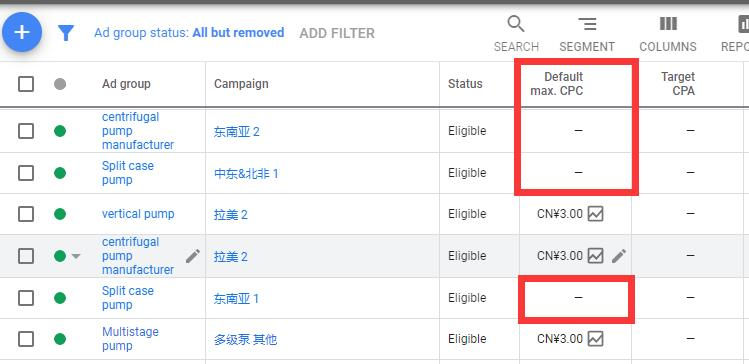
So, now that we know what CPC is and how it is calculated, let’s answer the next big question – where can you find it? Well, you’d think it’s a simple answer, but it is not! There are a couple of places where you can look for your CPC, and we will go over all of them, one by one, so you do not miss out on any single one.
- Campaigns Dashboard – In the Campaigns tab, you can find an overview of your campaigns. To see the specific CPC metric, go to the column icon, click on the “Modify columns” and search for “Avg. CPC.”
- Ad Group – additionally, you can see more detailed information for each ad group by going into the CPC-related metrics for each ad group you have chosen.
- Keywords – next, you can see the CPC data for particular keywords; just change the column to show your “Avg. CPC”
- Reports – finally, you have the CPC you can find in your Google Ads Reports; to generate the specific one that will show you your CPC metrics, go to Reports, click on the Predefined reports and Custom reports; next, select “Average CPC” in your custom reports.
CPC vs CPA
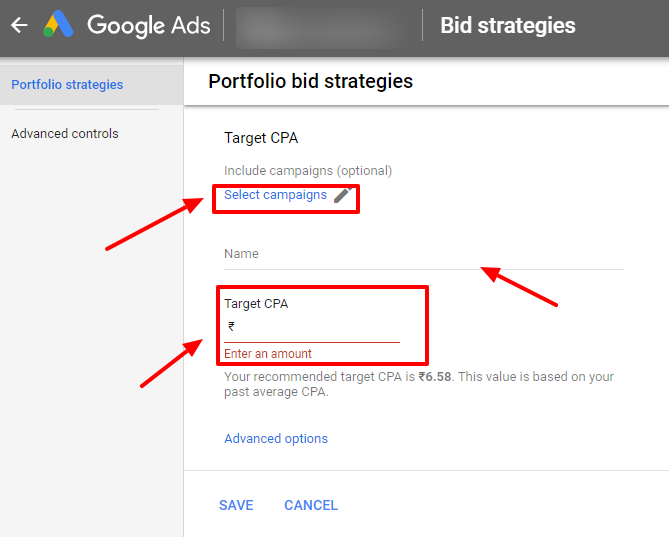
Let’s now talk briefly about the difference between CPC and CPA. Both are critical metrics used to measure the performance aspect of your advertising while also keeping an eye on the spending. Nevertheless, they are different, so it’s always important to find out how much they differ to understand the concept at hand even better.
CPC
As we have stated before, CPC is the amount of money you pay for each click you have gathered with your ad. It’s a pretty straightforward situation: you divide the total cost of the clicks by their total number. Cost-per-click (CPC) is mainly used to see the traffic that is going to the website. It does not matter what action the user has taken; it only means they clicked on the ad.
It’s mainly used for optimizing your spending and getting the least amount of money in the Google search or Google Display Network.
CPA
On the other hand, we have the cost-per-action. It’s the amount of money that an advertiser pays for their ad campaign, but it’s focused on the user’s particular action. It is mainly used to track conversions, such as obtaining a sale, getting signed up for a newsletter, or downloading an app. It’s calculated by dividing the whole cost of the entire campaign by all the acquisitions.
This particular metric aims to be as efficient with your advertising as possible. Tracking conversions or other desired actions is vital to keeping your business running, and getting it at the lowest cost is the goal of optimizing this metric.
How Much Does It Cost?
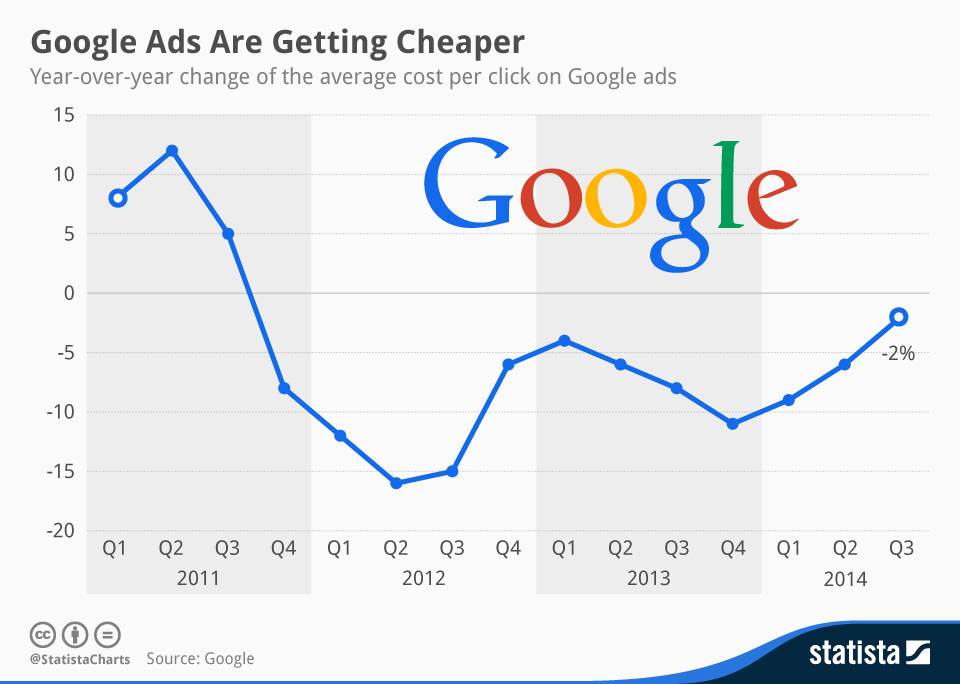
But in all seriousness, how much does it cost? As you can imagine, there is no simple answer to that question. Plenty of factors influence the cost of advertising, whether as simple as the popularity of specific keywords through more advanced industry-based limitations – there’s a lot to consider. Nevertheless, here are some of the most essential elements to remember when calculating ad costs.
- Competition – one of the critical elements to consider when calculating the cost of your ads is the competitiveness of your keywords; the more popular ones will often have a higher CPC, as there are more bidders for those;
- Quality Score – as we have mentioned before, quality score is an essential factor when it comes to the cost of your ads; the higher score you get, the lower price you will have when it comes to your ads;
- Ad Positioning – the position of your ad can also influence the cost; for example, the top posts in the search results are much more expensive than those on the bottom or in the corner;
- Location – depending on where you live, you may have a higher or lower cost of advertising; in high-earning countries, you can expect much higher CPC than in lower ones;
- Ad Scheduling – similarly, the time when your ad is displayed can play a substantial role in the pricing;
- Market Branch – and finally, your industry plays a significant role in how much you will pay for an ad; car ads will be more expensive than t-shirt ads, and so on;
We hope that you found something informative among all of this information, but there is a caveat we need to make to help you better understand the whole process. As you can see – there is no fixed price for a Google Ad. Your CPC can fluctuate depending on myriad circumstances.
There are plenty of factors to consider, and we have no idea what advertising campaign you plan to run. So, that may play a substantial role when choosing the right ad campaign for your needs. Optimize your ads and always fight for a higher quality score. It makes an impact. It’s not as big as just a lot of money would do, but it can change things up in regular circumstances. With that in mind, let’s review CPC averages in Google Ads.
What Is an Average Cost of CPC in Google Ads
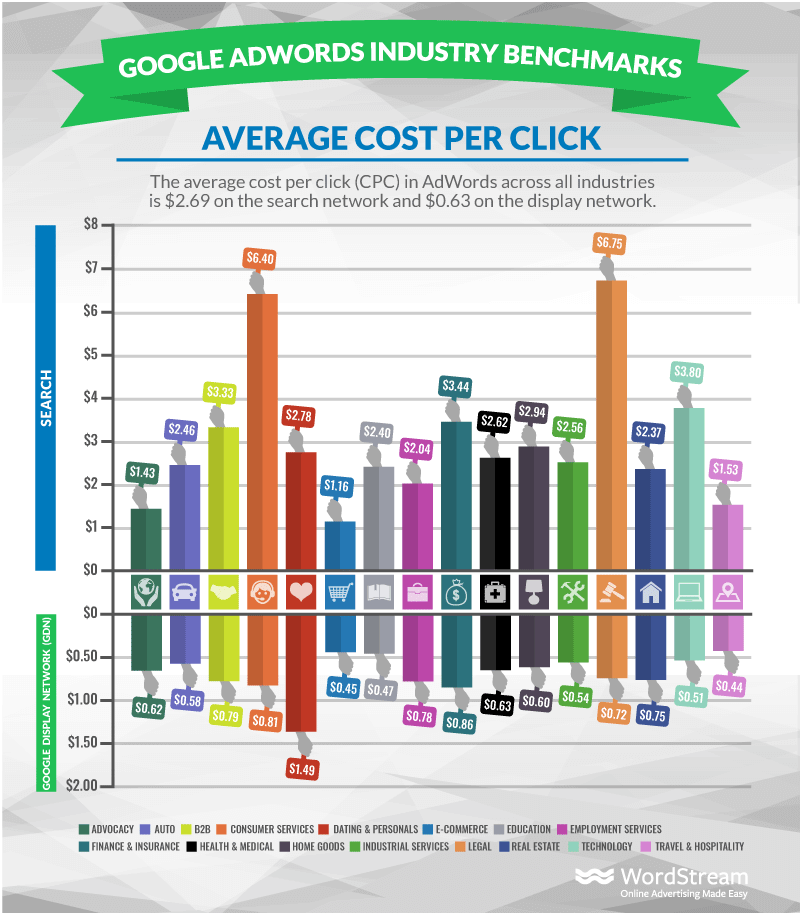
As we have mentioned before, you cannot simply predict how much your ad spend will turn out to be, as there are too many variables to look at. Of course, as the image suggests, there are some averages, but as you can see – those are also pretty specific. For starters, those numbers are strictly for the US market and are all benchmarks per industry.
Cost per click is usually between half a dollar to 2 dollars, with some more popular or money-oriented industries costing up to 50 dollars per click.
If you would like to find out how much you will pay for your keywords, you will have to do some testing with different types of ads, monitor how they are performing, and optimize them if necessary.
How to Lower the Cost of CPC?
But – there are some ways to improve your ads and lower the cost of CPC. You can do a couple of things to get more for less. For starters, think about the quality of your ads.
- Is it relevant to the search?
- Is the ad copy attractive and gathering attention?
- Is the ad visible?
- Is the landing page optimized and easy to navigate?
Each of those elements can bring your quality score up if optimized. To get the most out of your ads, ensure that you check the quality of your ad copy every step of the way. Of course, this will not bring it down entirely, but in tough spots, you will have the upper hand when you and the next person are bidding the same amount.
Additionally, make sure to do A/B testing to see what works and what to invest your time and attention in.
What is the Maximum/Minimum CPC in Google Ads?
Let’s review the maximum and minimum CPC concepts in Google Ads. It’s pretty essential, and there are plenty of queries on this topic, so it’s vital to get it right.
Max CPC
Let’s start with the maximum CPC. It’s the highest amount you will pay to click on your ad. It’s a cap on your bids to grant you some control over how much you are spending on your ads. You can adjust it later if you’d like; it’s not set in stone. The higher you make it, the more chance you’ll get that your ads will win the bidding war.
Minimum CPC
Well, there is none. You can’t bid zero dollars, that’s for sure, but there is no minimum bid as a concept. In some industries, though, the sphere is a minimum bid that is necessary to effectively compete in the marketplace. Despite all the talk about ad relevance, landing page optimization, ad auction, and such – it’s pretty important to actually make your ad be seen in the industry. So, don’t think about the minimum; try to optimize what you already have.
What Are High CPC Keywords?
And finally – what are some of the high CPC keywords that you’d want to keep in mind when creating your ads? Well, as with everything in this article – it depends. Different industries and different niches will have their own particular situations. Keywords associated with those industries are often where the bidding war happens, so make sure that you have your wallet ready. Here are some of the key elements that influence the keywords’ cost.
- Competition – the greater the competition, the higher the price. If there are plenty of people looking for “Christmas decorations,” you can be sure that your costs will skyrocket.
- High Commercial Intent – if you have an industry that is selling for a lot, you will pay a lot to advertise it. Legal, finance, and luxury – advertising that will cost you more than your average t-shirt-selling business.
- Niches – on the other hand, if you have a niche to advertise for with pretty complex products of high value – you will also have a higher price to pay for your advertising.
- Seasonal Products – and finally, as with our example of “Christmas decorations” – you can be sure that those keywords will get more expensive in November/December.
Manual or Enhanced?

Another important aspect that you will often hear about regarding Google Ads is whether you should use manual CPC or Enhanced CPC as your bidding strategy. Both of those allow you to manage your bids, with manual giving you more control (if you know what you’re doing) and enhanced allowing you to utilize the great power of Google Algorithm. Let’s now go over what it means exactly and how you can implement it in your ad campaigns to make your actual CPC go as low as possible!
Manual CPC
Let’s start with manual CPC bidding. This gives you complete control over the user’s search query. You can choose whichever keywords you’d like, change them around, see what works for you and what does not, and help you better understand the overall strategy. Indeed – you will be solely responsible for what is going on with your ad text, so all the positive and negative keywords will be set by you and you alone.
When it comes to bidding strategies, it’s definitely great if you would like to calculate the cost and ensure the max CPC bid is taken to, well, max. But you will have to have some knowledge of what it means to create an ad like that and how to implement it to the best of your ability.
Enhanced CPC
Enhanced CPC, on the other hand, does the heavy lifting for you, as it can help you out with your advertising efforts more efficiently, as it utilizes terabytes of data that Google has on the users and their behaviors online. It’s definitely recommended for people who are just starting with Google Ads and those who don’t have that much time to constantly monitor and optimize their ads. It may feel like it’s not doing enough of the heavy lifting at first, but trust us – it knows what it’s doing.
The learning period can take some time, but after it finally gets what you are trying to accomplish, it will be ruthless with its approach. So – it’s always a good idea to trust an algorithm that knows human behavior better than humans.
What Is CPC – Google Ads Edition – Conclusion
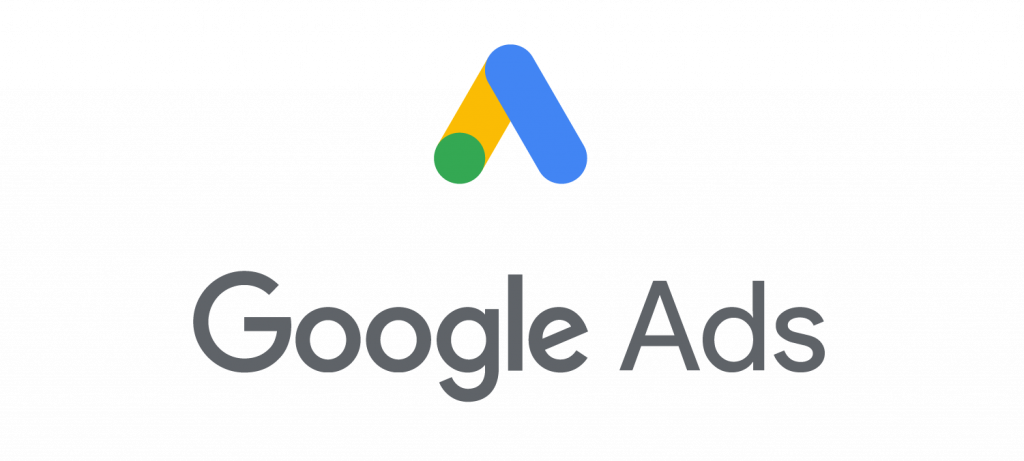
That’s it for today! We hope that we could help you out in understanding CPC better, whether this would mean optimizing your landing pages, where your ad appears in the search or display ad network, and overall – how to calculate the cost of your campaign. Be sure to check out other articles on our site to gain more insight into the topic.

A PPC specialist who started with organic social media. For several years, the core of his activities are:- Google Ads, Microsoft Ads, Meta Ads, TikTok Ads, Twitter Ads, Linkedin Ads. He has led campaigns with a global reach, e.g. for FootballTeam, G2A, ETOTO, as well as many smaller campaigns in the sports, construction and financial industries. Has full focus on ROAS. Privately, a fan of football, history of wars and Star Wars.

